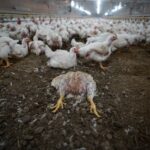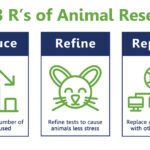In contemporary society, the dialogue surrounding animal welfare on farms remains conspicuously muted. While discussions about animal rights have gained traction in public forums, the intricacies of farm animal welfare seem to elude comprehensive examination. This conundrum invites deeper scrutiny, as the reasons for the reticence to broach the subject may not be immediately evident.
One prevalent observation is the disconnection that exists between consumers and the sources of their food. Urbanization has estranged many individuals from a pastoral lifestyle, resulting in a detachment from agricultural realities. This schism fosters a certain naiveté regarding the lives of farm animals and the ethical implications underlying their rearing. To many, issues of animal welfare are relegated to a hypothetical milieu, abstracted from the quotidian choices made at grocery store aisles or dinner tables. When it comes to discussions surrounding animal treatment, consumers often exhibit a reluctance to confront the disquieting truths of modern agriculture.
This tendency can be attributed to cognitive dissonance—the psychological discomfort experienced when one’s beliefs are in conflict with their actions. Most people desire to act ethically, yet their consumer habits often contradict this aspiration. Knowledge of the realities faced by farm animals—crowded living conditions, systemic neglect, and brutal slaughter practices—can evoke feelings of guilt and helplessness. Such emotional turmoil may prompt individuals to avert their gaze rather than grapple with the uncomfortable truths. Thus, conversations about animal welfare become eclipsed by a collective desire to maintain a palatable perspective on food production.
Moreover, a significant factor impeding dialogue about animal welfare on farms is the contentious nature of the agricultural industry itself. Farming practices are deeply interwoven with cultural, economic, and political dimensions. Farmers often face tremendous pressure to maximize production in an increasingly competitive market. This economic imperative may lead to practices that prioritize efficiency over ethics. Consequently, discussions surrounding animal welfare are often perceived as assaults on farmers’ livelihoods rather than constructive critiques aimed at improving conditions for animals.
The agricultural lobby wields significant influence over policy-making, striving to maintain the status quo when it comes to farming practices. Efforts to enact reform in animal welfare are frequently met with resistance from established agribusiness interests that capitalize on raising animals in large-scale, industrialized settings. These factions effectively dominate the narrative, framing animal welfare discussions as impractical or detrimental to economic stability. Hence, individuals who raise questions about animal treatment may feel marginalized or intimidated, leading to further reticence to address the subject.
Another dimension is the reliance on social constructs that commodify animals. The societal perception of animals as mere resources complicates the conversation surrounding their welfare. When animals are viewed solely through the lens of utility, their suffering is often trivialized or disregarded. This commodification is perpetuated by marketing strategies and consumer culture that sanctify certain products while demonizing others. As a result, discussions about animal welfare may be relegated to niche circles, while mainstream rhetoric focuses on the economic and nutritional value of animal products.
Additionally, the sensationalism often associated with animal rights activism can stymie productive dialogue. When advocates resort to graphic imagery or incendiary rhetoric, they risk alienating those who might otherwise engage in a thoughtful conversation about animal welfare. This polarization creates an environment where individuals may feel defensive, perceiving discussions about welfare as confrontational rather than collaborative. Moreover, simplistic narratives that divide stakeholders into heroes and villains detract from the complexity inherent in animal agriculture, hindering nuanced understanding.
Education plays a pivotal role in reframing the conversation around animal welfare. Initiatives that promote transparency in farming practices and emphasize humane treatment of animals can foster a more informed public. Encouraging critical thinking about food sources can empower consumers to make conscious choices that align with their values. Comprehensive educational programs, coupled with accessible information about the realities of farm animal welfare, may bridge the gap between consumers and the agricultural sector, engendering a dialogue that prioritizes both ethical treatment and sustainable practices.
Furthermore, fostering interconnections between urban and rural communities can enhance discussions about animal welfare. Initiatives that facilitate direct engagement between consumers and farmers—such as farm visits, farmers’ markets, and educational workshops—can demystify agricultural practices and dismantle stereotypes. By fostering empathy and understanding, these interactions can galvanize a collective movement towards improving animal welfare standards.
As society grapples with the implications of food choices, it is imperative to rethink how animal welfare is discussed on farms. Moving beyond mere acknowledgment of the subject will require a concerted effort to cultivate a more compassionate dialogue. This endeavor involves addressing the emotional, cultural, and economic factors that inhibit discussions about animal treatment. By confronting uncomfortable truths and fostering constructive conversations, it is possible to pave the way for meaningful reforms that enhance the welfare of animals in agricultural settings.
Ultimately, the question remains: why can’t we talk about animal welfare on farms? The answer lies within the complexities of human psychology, societal values, and systemic structures that perpetuate the status quo. By embracing the challenge of this discourse, society can take significant strides towards a future where animal welfare is prioritized, enabling a culture that values compassion over convenience.





